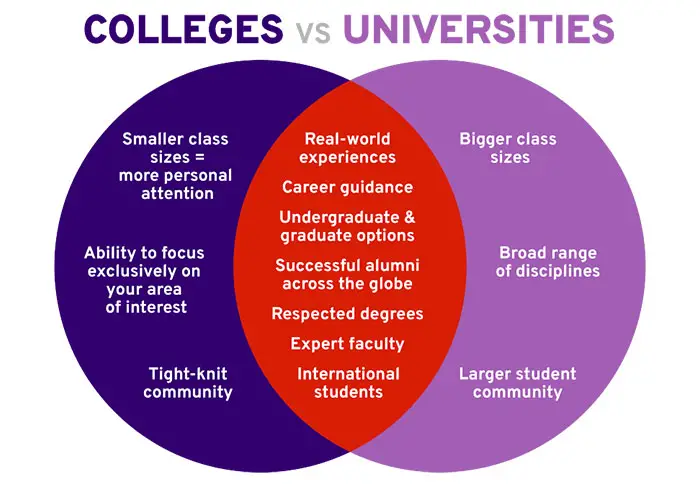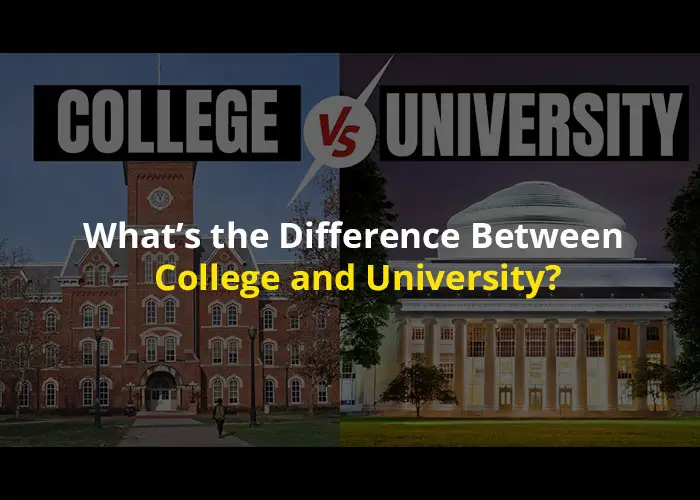Introduction: Making the Right Choice for Your Higher Education Journey
Deciding between a college and a university can be overwhelming, especially when you’re preparing for higher education. The terms “college” and “university” are often used interchangeably, but they have distinct differences that could impact your learning experience and career goals.
Understanding the difference between college and university is crucial when planning your higher education. Although the terms are often used interchangeably, they represent two distinct types of educational institutions with key differences in degree programs, tuition fees, class sizes, and research opportunities.
Understanding the Basics: College vs. University

What is a College?
A college is usually a smaller institution that primarily offers undergraduate degrees, such as associate’s and bachelor’s degrees. Some colleges are specialized, focusing on specific fields like liberal arts, technology, or business. In some countries, “college” may also refer to community colleges that offer two-year programs before transferring to a university.
Key Characteristics of a College:
- Smaller Class Sizes: Enjoy a more personalized learning experience.
- Undergraduate Focus: Most colleges offer limited or no postgraduate programs.
- Vocational Training: Provides hands-on training for specific careers.
- Lower Tuition Fees: Typically more affordable than universities.
- Tight-Knit Community: Students benefit from closer connections with peers and faculty.
What is a University?
A university is a larger institution offering undergraduate, graduate, and doctoral programs. Universities typically conduct research, provide diverse academic opportunities, and offer professional degrees like law, medicine, and engineering.
Key Characteristics of a University:
- Diverse Degree Options: Undergraduate, postgraduate (Master’s), and doctoral (Ph.D.) programs.
- Research Opportunities: Access to advanced research facilities and grants.
- Larger Student Population: More diversity in class sizes and campus activities.
- Global Reputation: Degrees from top universities often carry international recognition.
- Wide Extracurricular Activities: Clubs, sports, societies, and cultural events.
College vs. University: Key Differences at a Glance
Here’s a quick comparison to help you understand the major differences between colleges and universities:
| Factor | College | University |
|---|---|---|
| Size & Scope | Smaller, focused on undergraduate studies | Larger, offers undergraduate, graduate, and doctoral programs |
| Degree Options | Associate’s, Bachelor’s | Bachelor’s, Master’s, Ph.D. |
| Research Opportunities | Limited research focus | Extensive research facilities and funding |
| Class Size | Smaller, personalized interaction | Larger, with diverse faculty and student body |
| Tuition Fees | Generally lower | Higher due to advanced facilities and research |
| Extracurricular Activities | Fewer clubs and sports | Wide range of extracurricular options |
| Funding | Limited funding | Access to research grants and larger budgets |
Why Choose a College?
Colleges are ideal for students seeking personalized attention, affordability, and focused programs.
Advantages of Attending a College:

- Personalized Learning Experience – Smaller class sizes foster closer relationships with professors.
- Affordability – Lower tuition fees make colleges a budget-friendly option.
- Specialized Programs – Many colleges offer tailored programs in areas like liberal arts, technology, and business.
- Shorter Programs – Associate degrees can be completed in just two years.
- Close-Knit Community – Enjoy a supportive and engaging campus environment.
Why Choose a University?
Universities offer broader academic opportunities, diverse degrees, and extensive research facilities.
Advantages of Attending a University:
- Diverse Degree Programs – Access undergraduate, graduate, and doctoral courses.
- Research Opportunities – Participate in cutting-edge research projects.
- Global Recognition – Degrees from top universities are respected worldwide.
- Networking Opportunities – Connect with a large alumni network and industry professionals.
- Vibrant Campus Life – Join a variety of clubs, sports teams, and cultural societies.
How the Terms “College” and “University” Vary by Country
The definition of “college” and “university” can vary depending on where you are. Here’s a global perspective on how these terms are used in different countries:
- United States:
- College: Primarily offers undergraduate programs.
- University: Offers both undergraduate and postgraduate degrees.
- United Kingdom:
- College: Provides further education or is part of a university (e.g., Oxford colleges).
- University: Grants degrees and conducts research.
- Canada:
- College: Focuses on diplomas and vocational training.
- University: Offers full academic degrees and research programs.
- India:
- College: Typically affiliated with a university and offers undergraduate degrees.
- University: Has the authority to grant degrees independently.
- Australia:
- College: Often refers to vocational or training institutions.
- University: Offers academic degrees and postgraduate research opportunities.
Factors to Consider When Choosing Between a College and a University
When deciding between a college and a university, consider these key factors:
- Career Goals:
- Want hands-on vocational training? A college might be better.
- Interested in research, law, or medicine? A university could be the right choice.
- Financial Considerations:
- Colleges tend to have lower tuition fees, making them more affordable.
- Universities may cost more but often offer scholarships and financial aid.
- Learning Style:
- Prefer smaller, interactive classes? Choose a college.
- Comfortable with larger classes and independent learning? Go for a university.
- Networking and Career Opportunities:
- Universities offer larger alumni networks and career fairs.
- Colleges can also provide strong local job placements and community connections.
- Research and Extracurricular Activities:
- Universities have more research funding and a wider range of extracurricular activities.
- Colleges focus more on teaching and practical training.
Conclusion:
Both colleges and universities play a crucial role in higher education. The best choice depends on your personal preferences, career goals, and financial situation.
- If you want affordable, specialized programs and smaller class sizes, a college might be the perfect fit.
- If you’re looking for diverse degree options, research opportunities, and vibrant campus life, consider a university.




